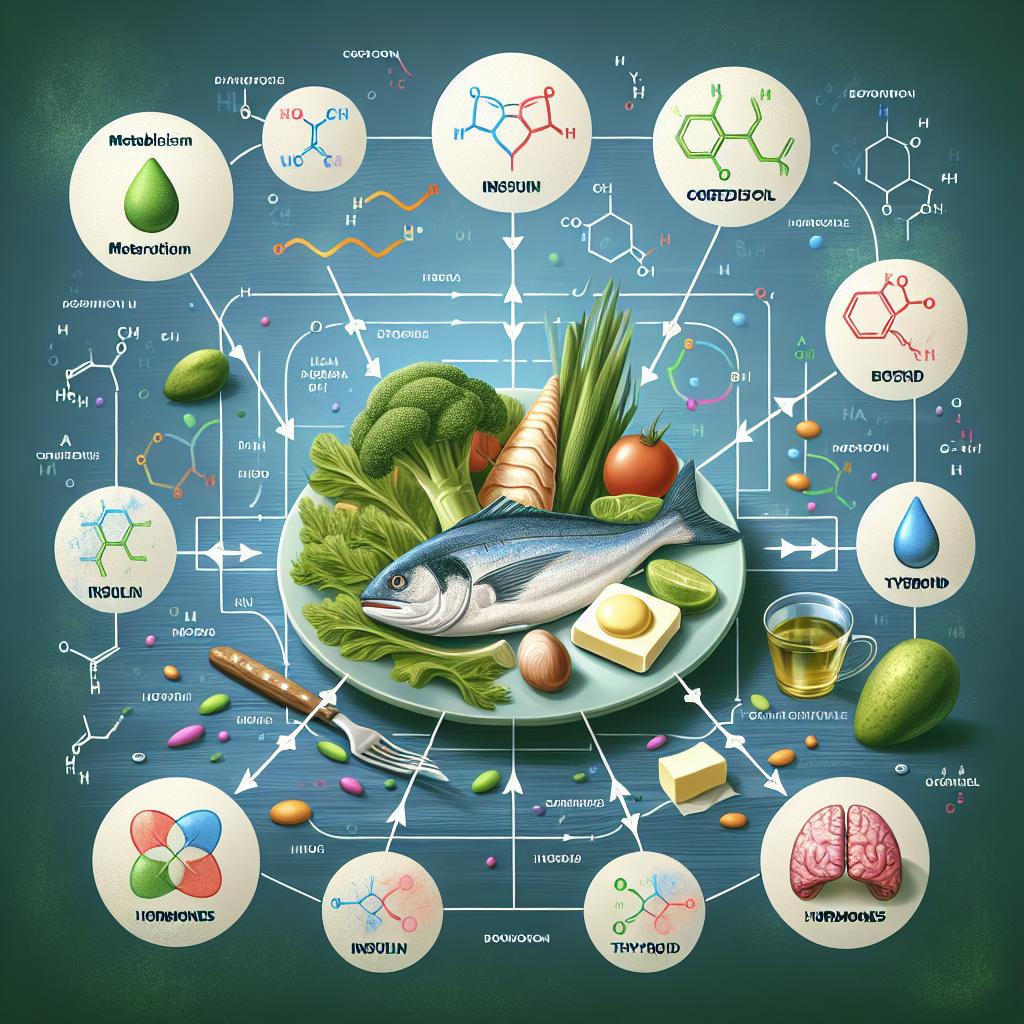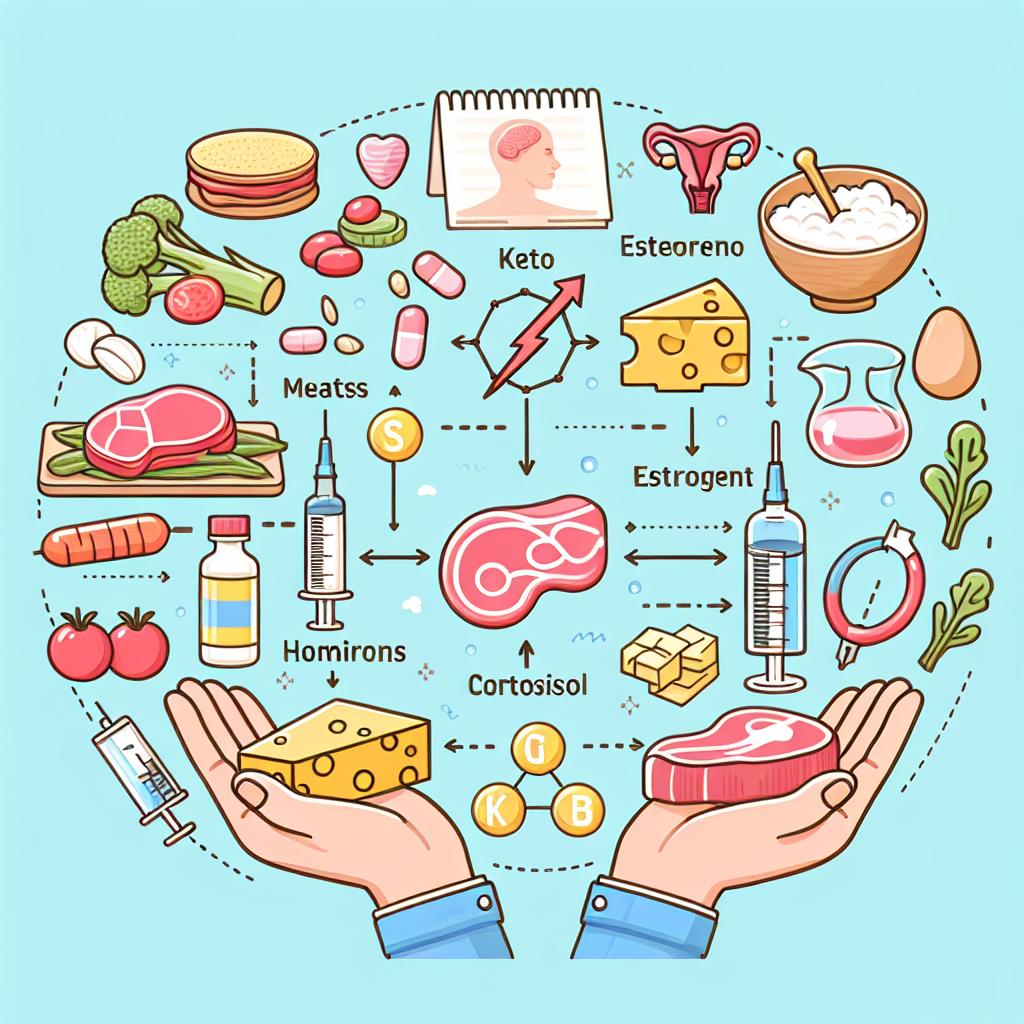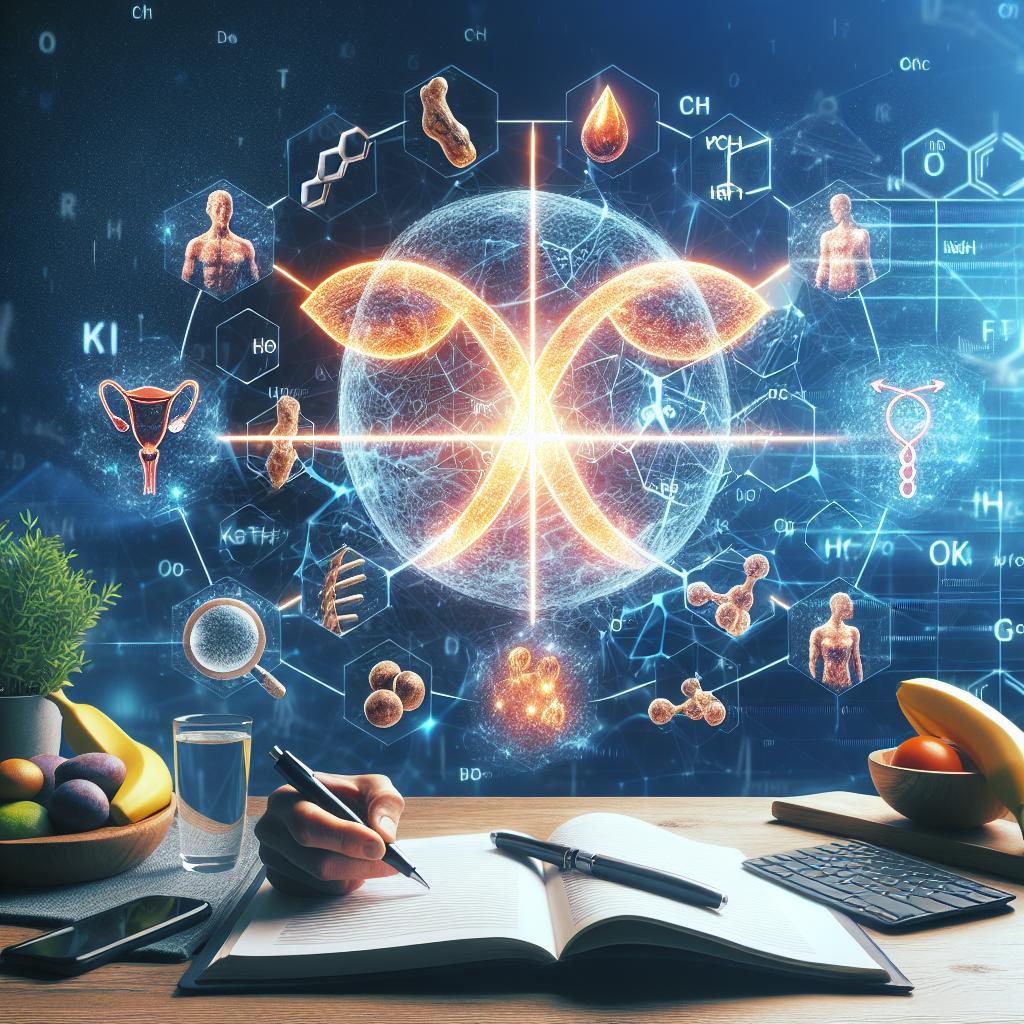This post may contain affiliate links which means I may receive a commission for purchases made through links. Learn more on my Private Policy page.
Keto Diet and Hormones: What’s the Connection?
Welcome to the intriguing world of the keto diet—a realm where low-carb lifestyles meet the fascinating science of hormones! If you’ve ever rummaged through the pantry looking for snacks while wondering how your food choices affect your body, you’re not alone. Imagine a diet that not only helps you shed unwanted pounds but also dances hand-in-hand with your hormones, optimizing energy levels, mood swings, and cravings along the way. In this cozy corner of the culinary universe, we’ll unravel the connection between the ketogenic diet and your hormonal symphony, exploring how fats, proteins, and the careful reduction of carbs can harmonize your body’s intricate systems. So grab your favorite cup of herbal tea, settle in, and let’s embark on this deliciously enlightening journey together!
Understanding the Hormonal Symphony: How Keto Diet Alters Your Bodys Musical Notes
The intricate dance of hormones within your body resembles a perfectly orchestrated symphony, where each instrument plays a crucial role in achieving harmony. When you embark on a ketogenic diet, you introduce a profound shift in this melodic structure. As your body transitions into ketosis, it begins to rely on fat as its primary fuel source, which can lead to significant hormonal changes, such as altered insulin sensitivity and fluctuations in leptin and ghrelin levels. This shift not only influences your hunger cues but also affects how energy is stored and utilized, creating a new rhythm for your metabolism.
In this new hormonal landscape, several key players take center stage:
- Insulin: Levels decrease, helping fat stores to be more readily accessed.
- Leptin: Often rises, signaling satiety, which may reduce the urge to snack.
- Ghrelin: The “hunger hormone” can fluctuate, possibly leading to reduced appetite after an initial adjustment period.
Furthermore, the ketogenic diet can impact hormones related to stress, such as cortisol, potentially helping to stabilize your emotional and physical responses. These hormonal transformations contribute to the overall feelings of well-being often reported by those on a ketogenic journey, proving that when food choices change, so too can the body’s internal music.

Balancing Act: The Impact of Ketosis on Insulin and Blood Sugar Levels
Embracing a ketogenic diet significantly alters how our bodies manage insulin and blood sugar levels. When entering a state of ketosis, the body shifts from relying on carbohydrates for energy to burning fat, resulting in reduced blood sugar fluctuations. This transition may lead to lower insulin levels, as the demand for insulin decreases with the lower necessity for glucose. In turn, individuals often experience improved insulin sensitivity, which not only aids in weight management but can also have long-term benefits for metabolic health.
The benefits of this hormonal shifting during ketosis are compelling. Key factors include:
- Stabilized blood sugar: A keto diet can lead to fewer spikes and crashes throughout the day.
- Decreased hunger: Lower insulin levels can help regulate appetite, making it easier to adhere to dietary goals.
- Enhanced fat burning: With insulin levels kept in check, the body can efficiently utilize fat stores for energy.
Below is a quick comparison demonstrating how ketosis influences insulin and blood sugar levels:
| Parameter | Before Ketosis | During Ketosis |
|---|---|---|
| Blood Sugar Levels | Higher, spiking post-meals | Lower, more stable |
| Insulin Sensitivity | Generally lower | Improved |
| Hunger Levels | Frequent cravings | Reduced cravings |

Rewiring Your Hormones: The Effects of Keto on Thyroid Function and Metabolism
The ketogenic diet has gained traction not just for weight loss but also for its potential to influence hormonal balance, particularly regarding thyroid function and overall metabolism. When the body enters a state of ketosis, it primarily utilizes fats as a source of energy instead of carbohydrates. This shift can have profound implications for thyroid hormones, especially T3 (triiodothyronine) and T4 (thyroxine). Many proponents of keto suggest that the diet may enhance hormone sensitivity, leading to improved metabolic efficiency. However, this experience can vary; while some individuals report increased energy levels and better weight management, others may encounter a temporary dip in thyroid hormone levels due to the reduced carbohydrate intake, which is essential for optimal thyroid function.
Several factors contribute to the relationship between a ketogenic diet and thyroid health, highlighting the need for a personalized approach. Key elements include:
- Nutrient Intake: A well-balanced keto diet rich in vitamins and minerals can support thyroid function.
- Carbohydrate Cycling: Some may benefit from occasional carb cycling to prevent metabolic slowdown.
- Individual Variability: Each person’s hormonal response to dietary changes varies, necessitating careful monitoring.
| Impact of Keto on Thyroid Hormones | Possible Effects |
|---|---|
| Reduction in T3 levels | May lead to fatigue and weight gain |
| Increased Reverse T3 | Potential suppression of metabolism |
| Enhanced T4 secretion | Improved metabolic adaptation in some individuals |

Finding Your Balance: Tailoring the Keto Diet for Hormonal Health and Wellness
Striking the right balance in your ketogenic journey can be pivotal for optimal hormonal health. The keto diet, typically high in fats and low in carbohydrates, can influence various hormonal functions, thereby affecting everything from energy levels to mood. This balance is especially crucial for individuals experiencing hormonal fluctuations due to natural cycles, stress, or other lifestyle factors. Here are a few key aspects to consider:
- Individualized Macronutrient Ratios: Not everyone responds to macronutrient ratios the same way. Experimenting with different proportions of fats, proteins, and carbs can help you find what works best for your body.
- Incorporating Cycle-Supportive Foods: Foods rich in omega-3 fatty acids, fiber, and antioxidants can support hormone balance. Consider incorporating avocados, salmon, nuts, and leafy greens into your meal plan.
- Mindful Eating Practices: Listening to your body and maintaining a flexible approach can help prevent unnecessary stress, which can disrupt hormonal balance.
It’s also essential to monitor and understand how the keto diet affects your specific hormonal needs. Regular dietary adjustments can assist in managing hormonal symptoms effectively. Utilizing a simple tracking table can help you visualize your progress:
| Week | Macronutrient Ratio | Energy Levels | Hormonal Symptoms |
|---|---|---|---|
| 1 | 70% Fat, 20% Protein, 10% Carbs | Stable | Minor |
| 2 | 65% Fat, 25% Protein, 10% Carbs | Increase | None |
| 3 | 60% Fat, 30% Protein, 10% Carbs | Declined | Moderate |
Finding the right balance isn’t just about adhering to strict rules; it’s about personalizing your journey to better health by acknowledging your unique body rhythm and hormonal needs. This tailored approach not only enhances your keto experience but also fosters greater overall wellness.
Q&A
Q&A: Keto Diet and Hormones – What’s the Connection?
Q1: Hey there! I’ve been hearing a lot about the keto diet lately. Can you give me a quick rundown of what it is?
A1: Absolutely! The keto diet, short for ketogenic diet, is a low-carb, high-fat eating plan that pushes your body into a state called ketosis. In ketosis, your body becomes super-efficient at burning fat for energy instead of relying on carbohydrates. Think of it as switching your fuel source from regular gas to rocket fuel—it’s a boost for many!
Q2: So, how does the keto diet impact our hormones? I mean, I always thought diet was just about losing weight!
A2: That’s a fantastic question! While weight loss is a common goal, our hormones play a vital role in how and why we lose weight. The keto diet can influence hormones like insulin, leptin, and ghrelin. By reducing carbohydrate intake, insulin levels tend to drop, which can help your body unlock stored fat for energy. Plus, the increased fats can enhance leptin sensitivity, helping you feel more satisfied and in control of your hunger!
Q3: Insulin sounds familiar. What exactly does it do in our bodies?
A3: Great catch! Insulin is like your body’s little helper that regulates blood sugar levels. When we eat carbs, insulin levels spike, prompting cells to absorb glucose. However, constant high insulin levels can lead to resistance, making it harder to lose weight. The keto diet can help lower insulin levels, which not only aids fat burning but also decreases fat storage—talk about a double whammy!
Q4: I’ve heard about leptin and ghrelin too. How does the keto diet affect them?
A4: Leptin is like your body’s signal that says, ”Hey, I’m full!” while ghrelin is more of a “It’s time to eat!” messenger. The keto diet may help balance these hormones. When you consume more healthy fats, leptin levels can increase, leading to greater feelings of fullness. On the flip side, reduced carb intake often lowers ghrelin levels, meaning those constant cravings can take a back seat. Who knew these hormones could be such good pals on your dietary journey?
Q5: Is there anyone who should avoid the keto diet due to hormonal concerns?
A5: While the keto diet can offer many benefits, it’s not for everyone. People with specific hormonal conditions, like thyroid issues or adrenal fatigue, might want to approach it with caution. It’s always a good idea to consult with a healthcare professional before making significant changes to your diet, especially if you have underlying health concerns.
Q6: Any last tips for those looking to try the keto diet for hormonal benefits?
A6: For sure! If you’re thinking of diving into the keto pool, remember to prioritize whole foods, stay hydrated, and listen to your body. Additionally, incorporating a variety of healthy fats—think avocados, nuts, and olives—can provide essential nutrients that support hormone health. And most importantly, enjoy the journey! It’s all about finding what works best for your body and lifestyle.
Q7: Thanks for clarifying all of this! Where can I learn more about the keto diet and hormones?
A7: You’re very welcome! There’s a treasure trove of information online, from articles to podcasts and even communities dedicated to keto living. Just remember to stick to reputable sources and consider tapping into a healthcare provider if you have specific concerns. Happy exploring, and here’s to a balanced, healthier you!
In Retrospect
As we wrap up our journey through the intricate dance of the keto diet and hormones, it’s clear that this connection is more than just a simple equation of fats and carbohydrates. It’s a fascinating interplay of science and self-discovery that can lead to a healthier, happier you.
By understanding how the keto diet influences hormonal balance—from insulin to cortisol and beyond—you’re not just changing your plate; you’re potentially transforming your entire wellness landscape. Whether you’re looking to boost energy levels, enhance mental clarity, or manage your weight, tuning in to your body’s signals is key.
So, as you embark on your keto adventure, remember that every bite is an opportunity to learn more about yourself and how your body responds. Embrace this journey with an open mind and a loving heart, and don’t hesitate to experiment and adjust as you go.
After all, health is not a one-size-fits-all approach, and your unique path will reveal the best version of you. Here’s to happy eating and harmonized hormones! 🥑✨

